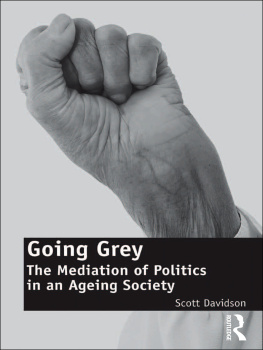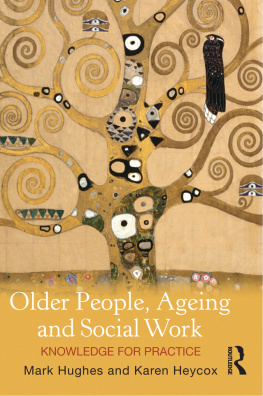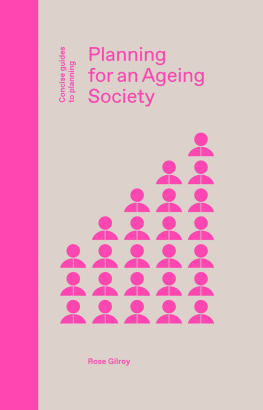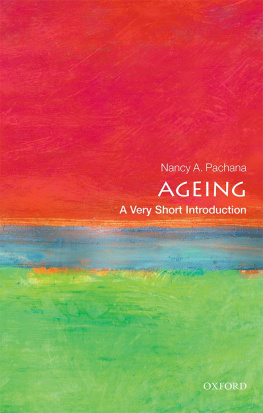GOING GREY
Going Grey
The Mediation of Politics in an Ageing Society
SCOTT DAVIDSON
University of Leicester, UK
First published 2012 by Ashgate Publishing
Published 2016 by Routledge
2 Park Square, Milton Park, Abingdon, Oxon OX14 4RN
711 Third Avenue, New York, NY 10017, USA
Routledge is an imprint of the Taylor & Francis Group, an informa business
Copyright Scott Davidson 2012
Scott Davidson has asserted his right under the Copyright, Designs and Patents Act, 1988, to be identified as the author of this work.
All rights reserved. No part of this book may be reprinted or reproduced or utilised in any form or by any electronic, mechanical, or other means, now known or hereafter invented, including photocopying and recording, or in any information storage or retrieval system, without permission in writing from the publishers.
Notice:
Product or corporate names may be trademarks or registered trademarks, and are used only for identification and explanation without intent to infringe.
British Library Cataloguing in Publication Data
Davidson, Scott.
Going grey : the mediation of politics in an ageing society.
1. Mass media--Political aspects--Great Britain. 2. Mass media and older people--Great Britain. 3. Older people in mass media. 4. Population aging--Political aspects--Great Britain. 5. Older people--Political activity--Great Britain. 6. Political campaigns--Social aspects--Great Britain.
I. Title
324.7'3'0941-dc23
Library of Congress Cataloging-in-Publication Data
Davidson, Scott, 1954-
Going grey : the mediation of politics in an ageing society / by Scott Davidson.
p. cm.
Includes bibliographical references and index.
ISBN 978-1-4094-3392-7 (hbk.) -- ISBN 978-1-3155-8537-6 (ebook) 1. Older people--Political activity--Great Britain. 2. Population aging--Political aspects--Great Britain. 3. Political campaigns--Great Britain. 4. Mass media--Political aspects. 5. Mass media and older people--Great Britain. I. Title.
HQ1064.G7D38 2012
305.260941--dc23
2012020463
ISBN 9781409433927 (hbk)
ISBN 9781315585376 (ebk-PDF)
ISBN 9781317126218 (ebk-ePUB)
Contents
List of Figures and Tables
Figures
Tables
Acknowledgements
I arrived relatively late to academic research and publishing after deciding to change careers, leaving behind the world of public affairs and campaigning. So, this is my first full academic book publication, and it would not have been possible without the support and encouragement of some very important people in my life.
To Alison, who has gifted me the inspiration, courage and vision to make this new adventure possible. For showing belief in the moments when I was uncertain of the wisdom of walking away from a good career, and into the uncertainties of academia.
To Liberty for putting up with her fathers head being constantly buried in books or the laptop.
To Ernie and Shirley for making sacrifices, without which any of this would not have been possible.
Chapter 1
Introduction
Societies across the globe are experiencing rapid population ageing. Life expectancy in Great Britain is increasing at more than five hours a day and will continue to do so, at least into the medium-term future (Academy of Medical Sciences 2009). By the middle of the twenty-first century society will have an age composition never seen before in human history. In the 1880s just over 7 per cent of the population was aged over 60, similar to estimates of the sixteenth century but, lower than estimates of the proportion of older people in the seventeenth and eighteenth centuries. By the 1980s this proportion had incrementally crept up to 17 per cent, and over the past 50 years the population of the UK has aged considerably. While the proportion aged under 16 has decreased from 24 per cent to 20 per cent, the population aged over 60 has increased from 16 per cent to 21 per cent (Thane 2000). The ageing process will accelerate over the coming decades. Ageing will also apply to the working age population which will become much older as the baby boom generations of the mid 1960s age. According to the Government Actuarys Department (GAD) there were 1.7 million (10 per cent) more working age adults aged below 40 than were aged 40 and above in 2006. By 2020, as a result of the equalisation and increase in womens state pension age, there will be more working adults aged 40 and above than below 40. With further increases to the state pension age for both men and women there are projected to be 1.4 million (7 per cent) more working age people above 40 than below 40 (GAD 2008).
As a societal trend population ageing has some way to go before levelling off. The electorate that chooses the government of the day is ageing. The rise of the grey vote is already apparent at the start of the twenty-first century, but by the middle of the century it will have reached dramatic proportions. A key component in the future growth of the grey vote will be the fast approaching retirement of the baby boomer cohorts. The boomers have been identified by a number of commentators as significant, not just for their weight of numbers, but for their qualitatively different characteristics as a cohort. The boomers are seen as possessing higher expectations of consumer and public services which will translate in political action with the necessary political reforms (Churchill and Mitchell 2004).
The demographic age-transition of British society raises many questions and holds a myriad of policy implications that are not limited to bread and butter ageing issues such as pensions, health and social care, but also ranges across family policy, the labour market and cultural change. As a significant element to its approach, this book has chosen to focus upon the challenges facing political parties and their communications and election campaigns. We live in what is sometimes described as a youth-obsessed society where only in the recent past one of the major parties of government, in the shape of the Labour party, re-branded itself as the new against the old, with its then leader Tony Blair making the case for his party in a book entitled My Vision of a Young Country. The country may be experiencing an age transformation, but in the 1990s at least it was still possible to develop a political brand in juxtaposition against the old. Only two decades later it must be questionable how tenable it would be for a major party to run against the demographic characteristics of the voters.
To study the changes that population ageing heralds for political communication it is also necessary to evaluate how the mass media are reporting and framing the implications of ageing. The extent to which media effects alter and influence political behaviour remains controversial and complex, however, even if the weight of evidence were to come down on the side of minimal impact on social attitudes, media content would still matter because the political elite believe in media effects and evaluate media content on a daily, sometimes hourly, basis (Gould 1999, Jones 2000, Rawnsley 2000, Barnett and Gaber 2001).
It is neither feasible nor desirable in any major study of this nature to attempt to separate the behaviour and story narratives of the media from party communications. This book accepts the arguments that the disciplines of political marketing the use of opinion research and environmental analysis to produce and promote a competitive offering which will help realise organisational aims and satisfy groups of electors in exchange for their votes (Wring 1997) as an increasingly useful model for explaining the behaviour of parties. Political parties that seek power need to achieve significant national vote (or market) shares to realise their basic strategic goals, but in the near future this market share cannot practically be obtained unless they obtain the polling endorsement of large numbers of older voters. The changes in communication content and style required to successfully campaign for grey votes will be delayed by the levels of residual ageism and the old orthodoxies of marketing and advertising practitioners who fear the implications of any brand being too closely associated with







